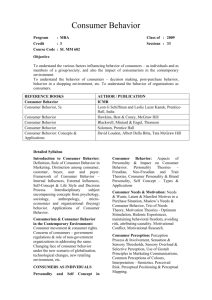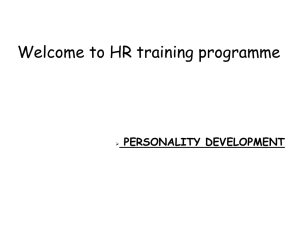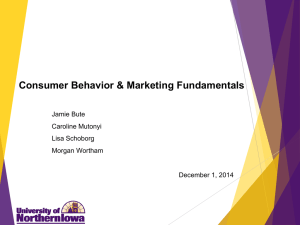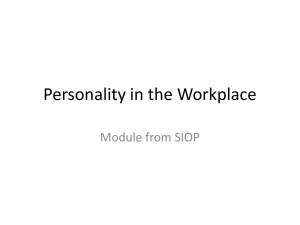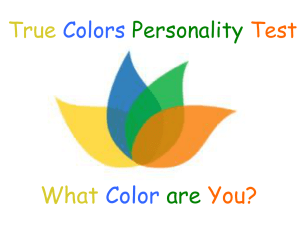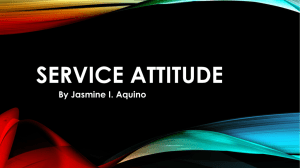MS-PowerPoint - Business Information Management
advertisement
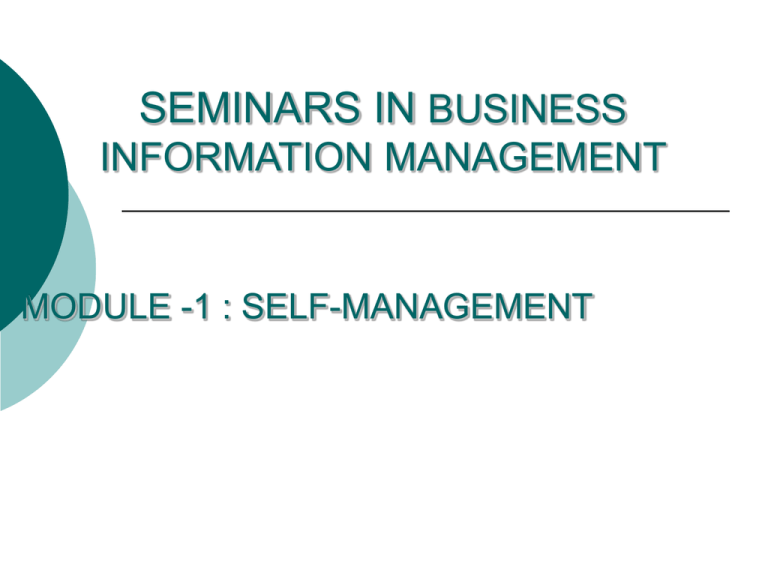
SEMINARS IN BUSINESS INFORMATION MANAGEMENT MODULE -1 : SELF-MANAGEMENT Chapter 1 Attitude, Goal Setting, and Life Management “The future belongs to those who believe in the beauty of their dreams.” Eleanor Roosevelt (1884– 1962) OBJECTIVES Define professionalism Define and describe personality and attitude and their influence in the workplace Identify individual personality traits and values Identify the influences of self-efficacy Identify and develop a strategy to deal with past negative experiences Define locus of control Identify your primary and secondary learning styles OBJECTIVES Describe the importance of goal setting Identify the impact setting goals and objectives will have on your life plan Set realistic goals Define goal-setting techniques Create short-term and long-term goals Describe the importance of setting priorities ALL ABOUT YOU “Mirror words” describe the foundation of how you view yourself and others, and how you will most likely perform at work Personality and attitude dictate how one responds to conflict, crisis, and other typical workplace situations. ALL ABOUT YOU Professionalism: workplace behaviors that result in positive business relationships. Human Relations: interactions with and through people Get along with your colleagues Positive workplace interactions will result in workplace productivity ALL ABOUT YOU Personality-a result of influences Experiences and influences outside of work affect one’s professional behavior Family, friends, religion, society In order to understand workplace relationships, you must first understand yourself PERSONALITY AND VALUES Personality: stable traits that assist in explaining and predicting behavior Behavior is a reflection of personality Positive: caring, considerate, organized Negative: rude, unfocused, lazy PERSONALITY AND VALUES Values: things that are important to you as an individual Values are only good or bad based upon your personal experiences and influences Values may include: achievement, family, money, or security Experiences shape your values TALK IT OUT What cartoon character best reflects you? ATTITUDES Attitude: a strong belief toward people, things, and situations An individual’s performance influences a group’s performance, which then impacts the organization’s performance Since you cannot avoid others, be aware of the impact other individuals have on your life SELF-EFFICACY AND ITS INFLUENCES Self-concept: how you view yourself Self-image: your belief of how others view you Self-efficacy: your belief in your ability to perform a task Projection: the way you feel about yourself and your environment is reflected in how you treat others DEALING WITH NEGATIVE “BAGGAGE” Past experiences impact your personality Baggage will affect your performance Confront your past Practice forgiveness Move forward Keep in mind that it is sometimes a painful process to reach your goal of becoming the best individual you can be LOCUS OF CONTROL Locus of control: identifies who you believe controls your future Internal locus of control believes the he or she controls his or her own future External locus of control believes that others control his or her future Extremes on either end are not healthy LEARNING STYLES Learning Style: the method of how you best take in information and/or learn new ideas Visual learner—learns best by seeing Auditory learner—learns best by hearing Tactile/kinesthetic learner—learns best by feeling, touching, and holding YOUR PERSONAL HANDBOOK Personality and attitude affect your performance both personally and professionally Use this text as a handbook to guide you in both personal and career plans Begin developing a positive attitude and believe in yourself and your abilities THE IMPORTANCE OF PERSONAL GOAL SETTING Goal: a target Think of it as a reward at the top of a ladder; you must climb the ladder before reaching the reward Goals provide focus; increase selfconcept; and help overcome procrastination, fear, and failure Setting goals will help you become more successful in your career INFLUENCES OF GOALS Goals help to make career plans more clear and meaningful As a goal is reached, you will experience motivation and selfconfidence Set goals in the major areas of your life including personal, career, financial, educational, and physical TALK IT OUT Discuss one goal that can be set for this class? HOW TO SET GOALS Achieving short-term and long-term goals is like climbing a ladder Goals need to be put into writing HOW TO SET GOALS Long-Term Goals Long-term goals: reached within a time frame of five to ten years Setting long-term goals starts with thinking of what you want to accomplish in your life From your list of accomplishments, choose items you most value Keep goals realistic, attainable, measurable, and important (have a reason for the goal) HOW TO SET GOALS Short-Term Goals Short-term goals: goals that can be reached within a year’s time Referred to as objectives in businesses Set to help reach long-term goals Keep them realistic, achievable, measurable, and important to you HOW TO SET GOALS SMART Method Specific Identify what you want to accomplish-quantify Measurable Identify how you know when you have achieved it Achievable Challenging, yet attainable and realistic Relevant Make it meaningful to you Time-based Attach a specific time to reach the goal HOW TO SET GOALS Goal Aspects Own the goal Each goal must belong to you YOU need to decide what your goals will be Control the goal Know what resources and constraints are involved Be flexible and maintain realistic control CREATING A LIFE-PLAN A life-plan includes: Education and career Social and spiritual Financial Activities CREATING A LIFE-PLAN Education and career Degrees/certificates Time frame Financial resources Support network Education is the key to achieving your life plan CREATING A LIFE-PLAN Career Why is your selected career important? How will you know if you achieve success? What resources are needed? Choosing the right career is important Different reasons include earning power, status, intellect, and self-satisfaction CREATING A LIFE-PLAN Social and spiritual Marriage Family Friends Religion What types of people do you want to be a part of your life in the future? CREATING A LIFE-PLAN Financial Home Car Ownership Where do you want to be financially? What amount of money will you be comfortable with? CREATING A LIFE-PLAN Activities Hobbies Travel Life experiences What do you want to be able to do in the future? CREATING A LIFE-PLAN Intrinsic (self-satisfaction) Rewards that come from within you Extrinsic (money, praise) Rewards that come from external sources TALK IT OUT Share common rewards that are important to you and identify those rewards as intrinsic or extrinsic PRIORITIES Priorities: determine what needs to be done and in what order You may need to adjust your priorities to reach your goals Trade-off: giving up one thing to do something else Be prepared to be flexible in all areas of your life-plan TALK IT OUT Identify priorities and tradeoffs for successfully completing this course

